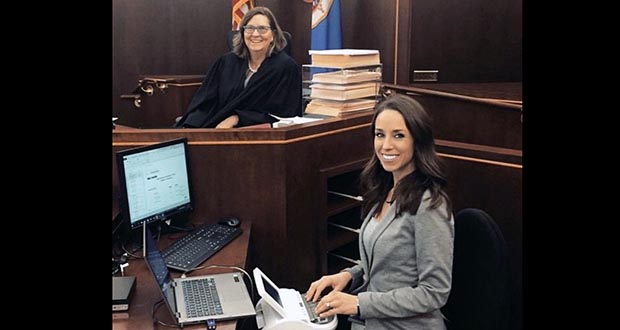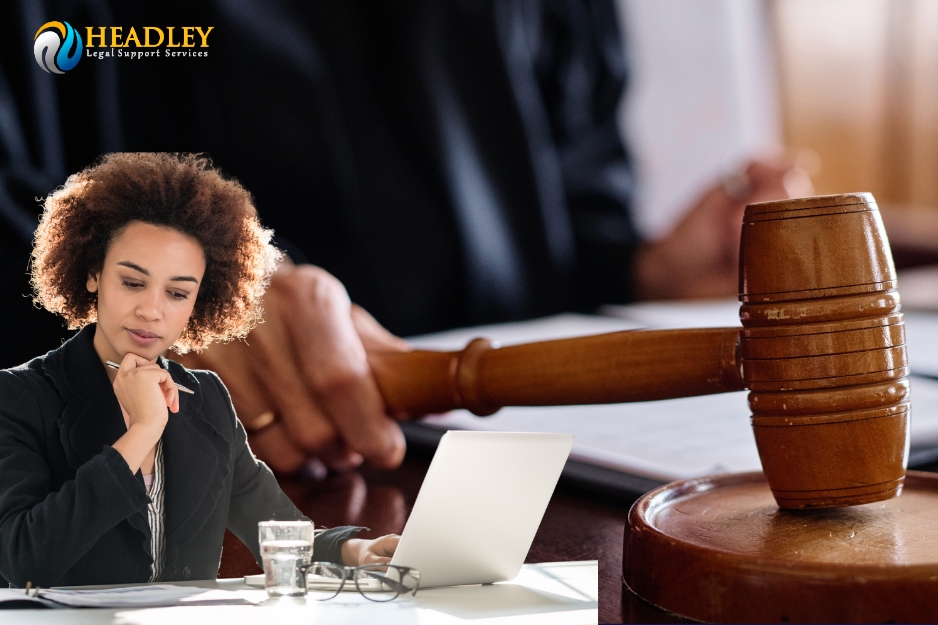Durham court reporting checklist for new attorneys
Recognizing Court Reporting: An Overview of Its Function in the Legal Process
Court reporting is an essential component of the legal system. It ensures that every spoken word throughout depositions and trials is precisely transcribed. This transcription supplies a trustworthy document for future recommendation. Stenotype reporter have specialized skills and must browse different modern technologies. durham court reporting. As the lawful landscape develops, so also does the role of these specialists. Understanding their effect raises crucial concerns concerning the future of lawful documents and liability
The Importance of Accurate Transcription in Lawful Procedures

Precise transcription plays a necessary duty in legal procedures, functioning as the structure for justice and liability. Court press reporters, tasked with recording spoken discussion throughout trials and depositions, ensure that every word is documented with accuracy. This transcription ends up being a critical record, allowing courts, attorneys, and judges to review the proceedings accurately. Mistakes or noninclusions in transcription can result in misconceptions, misinterpretations, and possibly unjust end results.
In addition, these records serve as official records that can be referenced in future lawsuits, charms, or academic analyses. The stability of the judicial process depends heavily on the dependability of these papers. The ability to provide a clear, verbatim account of arguments and testimonies is essential in promoting the guideline of legislation. The significance of precise transcription can not be overemphasized; it is vital for assuring fair tests and preserving public depend on in the legal system.
The Skills and Qualifications of Court Reporters
While the function of a stenotype reporter is crucial in the legal system, it needs a special collection of abilities and credentials to ensure effective performance. Efficiency in shorthand or voice writing is needed, allowing press reporters to catch spoken language precisely and successfully. Additionally, a solid grasp of lawful terminology and procedures is necessary, as stenotype reporter must understand intricate discussions that take place throughout tests and hearings.
Interest to detail and outstanding listening skills are required to ensure accurate records - durham court reporting. Lots of court press reporters possess accreditation from recognized programs, which frequently include strenuous training in transcription strategies and lawful principles. Solid social abilities likewise play a substantial role, as press reporters regularly communicate with witnesses, courts, and attorneys. Inevitably, the mix of technical proficiency, legal knowledge, and social capacities equips stenotype reporter to fulfill their duties effectively within the judicial system
Different Kinds of Court Reporting Services
Court reporting services include a selection of specialized features tailored to meet the requirements of the legal system. One prominent type is deposition reporting, where court reporters record witness statements beyond court settings, typically for use in trials. Another service is real-time reporting, which supplies instantaneous transcription throughout proceedings, making it possible for lawyers to access online message feeds. Additionally, some court reporters provide transcription of audio and video recordings, making certain accurate documentation of events.
Closed captioning services are additionally given, making lawful procedures easily accessible to people with hearing disabilities. Additionally, several court reporting firms concentrate on serving particular lawful fields, such as household legislation, criminal legislation, or company legislation, consequently using tailored knowledge. Some reporters may offer video clip deposition services, which boost the documents procedure through aesthetic context. Each sort of solution plays a vital function in guaranteeing the accuracy and stability of legal records.
The Modern Technology Behind Modern Court Reporting
Modern court reporting depends heavily on sophisticated modern technology to boost accuracy and efficiency. Stenography equipments, digital recording techniques, and real-time transcription software are integral elements of this area. These tools not just promote the transcription procedure but likewise assure that lawful procedures are documented with precision.
Stenography Machines Explained
Stenography equipments act as the foundation of contemporary court reporting, changing spoken words right into created text with impressive effectiveness. These specialized tools utilize a special key-board layout that enables stenotype reporter to kind syllables and words phonetically, enabling them to capture dialogue at high rates. The usage of shorthand signs indicates that press reporters can record discussions in actual time, making certain precise documents of legal process. Stenography makers are furnished with sophisticated modern technology, including software program that can translate stenographic notes into readable text. This assimilation of software and hardware greatly improves the rate and accuracy of court reporting, making it an important tool in the lawful area. Therefore, stenography remains a necessary skill for experts in the court room.
Digital Recording Techniques
Improvements in technology have actually expanded the devices readily available for court reporting beyond traditional stenography machines. Digital tape-recording methods have become a trustworthy choice, catching audio and video of legal process with high fidelity. These systems make use of microphones and videotaping tools purposefully placed to assure quality and minimize history noise, giving a comprehensive document of conversations and testaments. The taped material can be played back for accuracy during transcription, permitting court press reporters to confirm information efficiently. Furthermore, electronic recordings can be saved firmly for future referral, improving access and maintaining the stability of the lawful procedure. As courts welcome these modern innovations, electronic recording strategies play a progressively important duty in maintaining precise and effective paperwork.
Real-Time Transcription Software Application
As courts increasingly take on technology to enhance the lawful procedure, real-time transcription software has actually become an essential tool for court press reporters. This cutting-edge technology enables court press reporters to record spoken discussion quickly, offering immediate accessibility to accurate documents throughout procedures. By transforming talked words into text as they are spoken, real-time transcription software application helps with efficient communication between attorneys, judges, and other court individuals. The software program often integrates with court room stereo, making certain that every word is caught with accuracy. Additionally, it can produce records for testimonial and circulation, streamlining the documentation process. As an outcome, real-time transcription software program not just boosts the efficiency of court reporting yet likewise enhances the overall ease of access of legal procedures.
The Duty of Court Reporters in Preserving Court Room Honesty

Court reporters add to the openness of the judicial process. By supplying comprehensive transcripts, they make it possible for the public and media to accessibility court procedures, cultivating responsibility. Their existence in the courtroom also helps preserve etiquette, as their actions emphasize the seriousness of the legal process.
Along with technical abilities, court press reporters need to display expertise and impartiality, important for protecting the honesty of the judicial system. Ultimately, their attentive efforts sustain fair test rights and strengthen public self-confidence in the legal structure.
The Future of Court Reporting in an Evolving Legal Landscape
As the legal landscape advances, court reporting faces considerable adjustments driven by technological advancements and an expanding shift towards remote solutions. These developments are reshaping how court press reporters run, influencing both the rate and accuracy of legal documentation. The future of this occupation will likely depend upon its adaptability to these emerging patterns.
Technical Developments Affecting Reporting
Countless technological developments are improving the landscape of court reporting, ushering in a new age of efficiency and precision. Digital tape-recording systems have come to be commonplace, permitting exact audio capture during process. These systems often integrate with transcription software application, helping with faster turnaround times for transcripts. Additionally, man-made intelligence is playing a substantial duty in enhancing the transcription procedure, with speech recognition technology assisting press reporters in creating more exact documents. Furthermore, cloud-based storage space solutions boost ease of access, allowing attorneys to fetch and share records easily. As these technologies proceed to advance, they guarantee to additional change the court reporting profession, enhancing the total legal process while keeping high criteria of professionalism and reliability and honesty.
Shift In The Direction Of Remote Solutions
The legal landscape is significantly accepting remote services, improving just how court reporting is performed. explanation This change has been accelerated by technological advancements and the need for versatility during current global occasions. Court press reporters now helpful site utilize video conferencing platforms to assist in hearings and depositions, permitting higher access and effectiveness. Remote solutions enable participation from different places, lowering traveling prices and logistical obstacles. In addition, digital transcription tools improve precision and enhance the documentation procedure. As the lawful market adapts, court reporters are called for to develop brand-new abilities and acquaint themselves with emerging innovations. This evolution provides both difficulties and possibilities, pushing the occupation towards a much more incorporated, technology-driven future while retaining its core commitment to supplying trusted and precise legal paperwork.

Regularly Asked Questions
How Much Do Court Reporters Generally Earn Each Year?
Court press reporters commonly make between $50,000 and $100,000 annually, depending upon experience, place, and the need for solutions. Specialized abilities or certifications can even more raise their gaining potential in numerous lawful setups.
What Is the Typical Period of Court Reporting Training Programs?
Court reporting training programs typically last in between 18 months to 2 years. This duration differs based on the institution and the certain curriculum, incorporating both concept and functional skills important for aiming court press reporters.
Can Court Reporters Job Remotely for Legal Process?
Yes, court press reporters can function from another location for legal proceedings, utilizing modern technology to record sound and video feeds. This adaptability enables them to offer exact documentation while preserving the stability of the legal process.
What Is the Difference In Between a Court Press Reporter and a Stenographer?
A stenotype reporter specializes in recording lawful procedures, while a clerk concentrates on shorthand creating for different contexts, including meetings and meetings. Both functions include capturing talked words however differ in their certain applications and atmospheres.
Are Court Reporters Required to Have Accreditations or Licenses?
Yes, stenotype reporter are commonly needed to get certifications or licenses. These qualifications ensure they possess the needed abilities and knowledge to precisely record legal process, maintaining the stability of the judicial process.
Numerous court press reporters possess accreditation from accredited programs, which commonly consist of rigorous training in transcription strategies and legal principles. One noticeable type is deposition reporting, where court reporters transcribe witness testaments outside of court settings, frequently for usage in trials. As court rooms progressively embrace innovation to boost the lawful procedure, real-time transcription software application has become a vital device for court press reporters. Yes, court reporters can work from another location for legal procedures, making use of innovation to transcribe sound and video clip feeds. A court press reporter specializes in recording legal procedures, while a stenographer concentrates on shorthand composing for various contexts, including meetings and conferences.